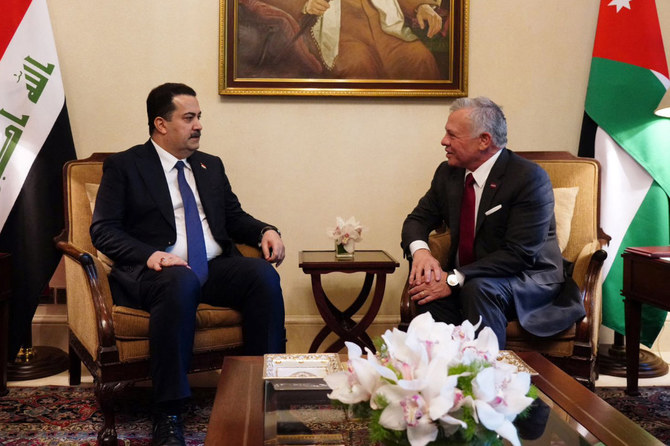Will Iraq consolidate its relations with the Arab Gulf states?

https://arab.news/zhegt
In an article published by the Annahar Al-Arabi website last month, Farouk Youssef asked: “Will a state of militias prevail in Iraq?” What prompted him to ask this question was that Mohammed Shia Al-Sudani, who has assumed the position of prime minister in Iraq, is a candidate for the Coordination Framework, which consists of a group of parties and currents known to be allied to the Iranian regime, while he also has a personal relationship that binds him to former Iraqi Prime Minister Nouri Al-Maliki.
These concerns led Youssef to fear “that opportunities will be open for militias to infiltrate the state in different forms and under different designations. The opportunity is ideal for the government to be dominated with its own consent, because Al-Sudani, who obtained his position without a conflict, will surrender to whatever terms are dictated to him.”
The return of increased control by armed militias on the various entities of the Iraqi state — after former Prime Minister Mustafa Al-Kadhimi worked to limit their influence — will affect Iraq’s foreign policy and potentially change it, especially toward the Arab Gulf states and Saudi Arabia in particular, which the militias are not fond of and consider to be an opponent.
From this point on, all parties concerned with Iraqi and regional matters will be monitoring the diplomatic speech of Baghdad, the activity of its foreign minister and ambassadors, and the extent to which it is serious in developing relations with the Arab world. The Arab Gulf states believe that a stable Iraq represents a necessity for the security of the Gulf and, therefore, they are not likely to take any negative steps toward the new government in Iraq and will monitor its performance, acting in consequence.
Crown Prince Mohammed bin Salman met with Iraqi President Abdul Latif Rashid on Nov. 7 on the sidelines of the second Middle East Green Initiative Summit, held in the Egyptian city of Sharm El-Sheikh. Minister of Energy Prince Abdulaziz bin Salman and Foreign Minister Prince Faisal bin Farhan attended the meeting, making a clear and explicit reference to the importance of the energy and diplomacy files in the relations between Riyadh and Baghdad.
These two files can form the foundation for further agreements between the two countries, which will be a continuation of what was agreed during Al-Kadhimi’s time in office. Al-Kadhimi sought to consolidate Iraq’s relations with its neighbors in the Arabian Gulf, specifically Saudi Arabia and the UAE, turning Baghdad into a regional player that was able to help bring together the views of influential countries, specifically Saudi Arabia and Iran, as the capital witnessed five rounds of direct negotiations between the two countries.
It is clear that Saudi Arabia is diplomatically active and aiming to consolidate positive relations with Iraq.
Hassan Al-Mustafa
The crown prince last month announced that Saudi Arabia’s Public Investment Fund will establish five more regional investment companies in Jordan, Bahrain, Sudan, Iraq and Oman. Across all six companies, the value of the targeted investments will reach SR90 billion ($24 billion) in opportunities across various sectors. It is noteworthy that Iraq is among the targeted countries, despite its volatile security and political environment, the Iranian influence through militias loyal to the Tehran regime, and the arrival of a new government whose mastermind many believe is Al-Maliki.
Al-Maliki is affiliated with the so-called axis of resistance, has close relations with Iranian political figures and does not hide his positions that are hostile to the policies of Saudi Arabia. However, Riyadh was quick to congratulate Al-Sudani on his assumption of office, with King Salman and the crown prince sending congratulatory cables. The Kingdom’s Ambassador to Iraq Abdulaziz Al-Shammari also paid a visit to Al-Sudani and Rashid.
Saudi Arabia’s Minister of Defense Prince Khalid bin Salman made a phone call to his Iraqi counterpart Thabet Mohammed Al-Absi on Nov. 6. During the call, the officials discussed ways of enhancing cooperation and coordination in the field of defense to serve the interests of both countries.
In light of all this, it is clear that Saudi Arabia is diplomatically active and aiming to consolidate positive relations with Iraq based on mutual respect and cooperation in the fields of energy, security, commercial exchange and defense, since the two neighboring countries share a land border of almost 1,000 km. A social and familial overlap also exists, as many of the Arab tribes are related by blood, especially in the border region. And the two countries have a common interest in cooperating against the danger of fundamentalist organizations such as Daesh and Al-Qaeda.
If Al-Sudani can persuade his allies of the importance of good relations with neighboring countries, ensure Iraqi decision-making is free of Iranian intervention, think about a neutral foreign policy and prevent militias from continuing to threaten to bomb vital oil installations in Saudi Arabia, then the new Iraqi government can develop Iraqi-Saudi relations. We could then witness a gradual building of trust, which would be in the interest of the security of the Arab Gulf and the development of its peoples.
This concept might be idealistic in view of the presence of armed parties in the Coordination Framework coalition, but this group also includes more moderate parties, such as Iraq’s National Wisdom Movement, headed by Ammar Al-Hakim, who visited Saudi Arabia in 2022 and met the crown prince. Therefore, it will be important for Al-Hakim, along with other moderates and technocrats, to prevent extremists from committing any hostile acts and to consolidate a national speech that respects the state’s sovereignty and limits the use of weapons exclusively to the security forces. This will be a very arduous task, albeit a necessary one for Iraq primarily, but also for its neighbors.
• Hassan Al-Mustafa is a Saudi writer and researcher interested in Islamic movements, the development of religious discourse and the relationship between the Gulf Cooperation Council states and Iran.
Twitter: @Halmustafa










































